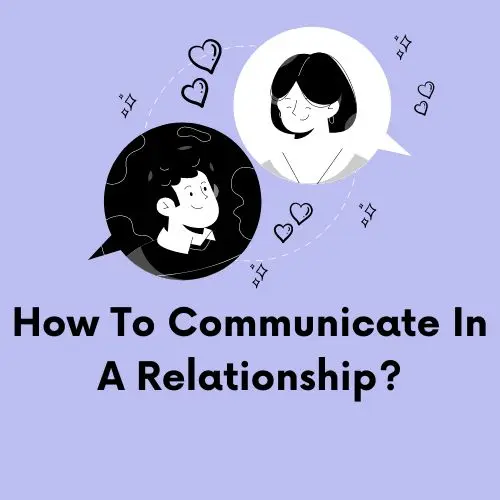Introduction
Beyond any doubt, communication serves as the essential basis needed to build relationships that succeed. People build stronger bonds through effective communication of thoughts and emotions and expressions of their concerns within all types of romantic and family bonds and professional relationships. The main reason behind conflict and breakup breakdowns in romantic relationships springs from inadequate communication approaches. Making progress in your communication skills through a relationship creates substantial improvements for emotional strength and conflict management.
The following text investigates the essence of communication as well as typical obstacles which block proper partner-to-partner exchanges while presenting established techniques for improved discussion and reception methods.
Table of Contents
| Topic | Key Insights |
|---|---|
| Importance of Communication | 93% of communication is non-verbal and tonal (Albert Mehrabian’s study) |
| Common Barriers | 65% of relationship conflicts arise from miscommunication |
| Active Listening | Active listeners are 70% more likely to resolve conflicts amicably |
| Conflict Resolution | Couples who practice healthy communication are 80% happier |
| Digital Communication | 60% of couples report misunderstandings due to texting |
| Emotional Intelligence | 90% of successful relationships thrive on emotional understanding |
The Importance of Communication in a Relationship
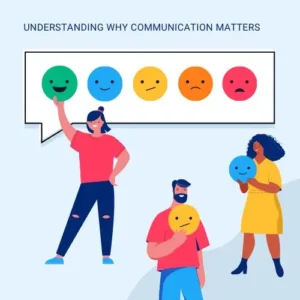
The absence of effective communication makes a relationship similar to a structure that fails because its base is weak. According to research couples who maintain productive communication patterns achieve better long-term happiness while enjoying relationship stability.
Key Benefits of Effective Communication:
- Strengthens emotional connection
- Reduces misunderstandings and conflicts
- Enhances trust and transparency
- Keeping your partner feels appreciated and understood
- Creates a supportive environment
Common Communication Barriers in Relationships
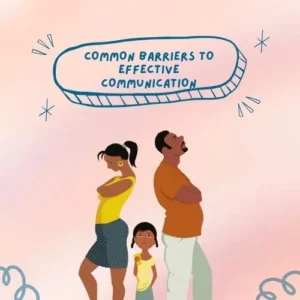
Despite its importance, communication often breaks down due to various barriers:
- Not asking your partner about their thoughts results in misinterpretations by making assumptions through mind-reading.
- Further problems arise when you stop listening to your partner before finishing their statement or start thinking about your response.
- Defending instead of thinking leads to heightened arguments between partners.
- An absence of emotional cues through digital communications between text messages and emails causes frequent failure in understanding by both parties.
- The practice of not handling situations directly because of suppressing emotions will produce accumulating resentment.
Understanding these barriers helps couples take proactive steps to communicate better.
How To Communicate In A Relationship?
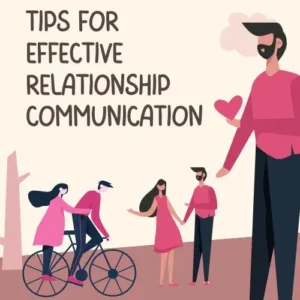
The following strategies can enhance communication and create a healthier, more fulfilling relationship:
1. Practice Active Listening
Listening actively means giving your partner your complete attention instead of simply hearing what is spoken.
- Maintain eye contact
- No matter the situation you should either move your head up and down or simply state how you understand the mentioned points (e.g., “I understand”).
- Turn the words back to verify your comprehension of the statements.
2. Use “I” Statements Instead of “You” Statements
Instead of saying, “You never listen to me,” try “I feel unheard when my concerns are dismissed.” This reduces blame and fosters constructive discussions.A more effective way to express your feelings is by stating “I feel unacknowledged after my concerns receive no attention.” This technique diminishes accusations so discussions develop positively.
3. Establish Open and Honest Conversations
Encourage openness by creating a safe space where both partners can share their thoughts without fear of judgment.
- Organize designated sessions dedicated to important dialogue between both partners.
- Avoid distractions (e.g., phones, TV)
- Be honest but respectful
4. Manage Conflicts Constructively
Every relationship experiences conflict, but the way couples handle disagreements makes all the difference.
- Both partners should concentrate on discussing the problem instead of launching aggressive verbal assaults against each other.
- Taking short rests becomes essential whenever intense emotions interfere.
- Hold the objective of finding solutions instead of insisting on personal victory.
5. Adapt to Each Other’s Communication Styles
People display their thoughts differently according to their individual personality. The communication process improves when you understand different communication styles between you and your partner.
6. Leverage Non-Verbal Communication
The fundamental components of strong communication depend on non-verbal signs which include facial expressions along with body language and tone of voice. Albert Mehrabian conducted research which showed that nonverbal elements together with tonality comprise 93% of communication signals.
7. Utilize Technology Wisely
While texting and social media are convenient, they can also cause misunderstandings.
- Never address severe topics through texting because misunderstandings are common
- Voice or video connection provides better options for complex discussion sharing.
- Set boundaries on digital communication
8. Develop Emotional Intelligence
Emotional intelligence (EQ) involves recognizing, understanding, and managing emotions—both yours and your partner’s.
- Practice empathy
- Control impulsive reactions
- Validate your partner’s emotions
9. Express Appreciation and Affection
Small gestures of gratitude and affection strengthen relationships.
- Compliment your partner often
- Physical affection should include hugging and kissing while you also maintain hand-holding contact.
- Gratify your lover with appreciation for everything they do.
10. Seek Professional Help When Needed
Relationship counselling should be considered when communication problems do not go away. A licensed therapist gives clients the chance to learn practical methods that strengthen relationship communication.
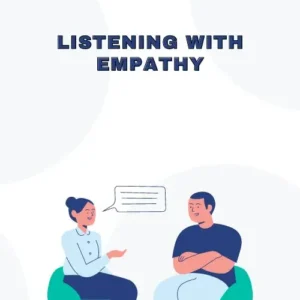
Final Thoughts
The foundation of emotional trust requires mastery of relationship communication which also leads to peace during conflicts and better intimacy. People with strong relationships use active listening with careful awareness of their words while handling conflict successfully to build lasting meaningful connections.
Making the effort combined with patience leads to better connection and enhanced understanding that in turn creates happier relationships.

